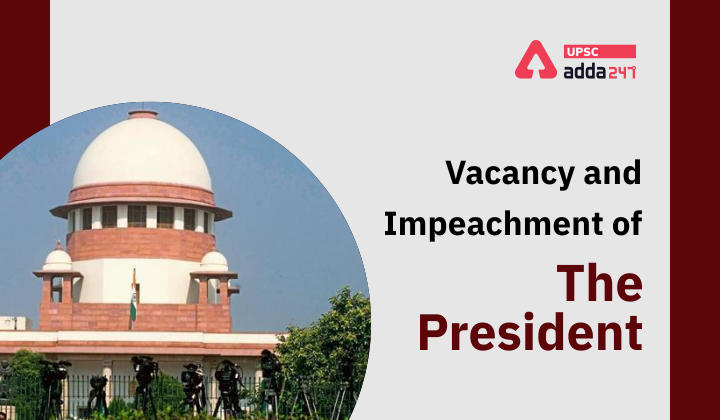Table of Contents
President of India- Relevance for UPSC Exam
- GS Paper 2: Indian Constitution- Historical underpinnings, evolution, features, amendments, significant provisions and basic structure.
President of India
- The President of India is the nominal head of the state of India. The President of India is also considered the first citizen of the Indian State.
- President of India is a part of Union Executive along with the Vice-President, Prime Minister, Council of Ministers, and Attorney-General of India.
- Part V of the Constitution of India from Article 52 to Article 78 deals with the Union Executive under which also comes President of India.
- Article 52 of the Constitution of India states that ‘there shall be a President of India’.
Vacancy in the Office of President
- Grounds for Vacancy in the Office of President: Following are the conditions under which the vacancy in the president’s office will be created-
- Expiry of the term: the President of India completes his term of five years in office.
- Death of the President of India while in Office
- Resignation: President of India resigns by putting forward his resignation to the Vice-President of India.
- Impeachment of the President: Lok Sabha/Rajya Sabha initiates an impeachment charge and they stand valid, he is removed.
- Otherwise, such as when the election of the President is declared void by the Supreme Court or he has become disqualified to hold the office anymore.
- Declaration of Election: Under the Constitution, an election for the President’s office has to take place within 6 months of the occurrence of the vacancy.
President of India | Key Functions and Powers of President
Who holds the Office of President in case of Vacancy (except expiration of the Term)?
President’s Act 1969 provides for who holds the office of president in case of vacancy.
- Vacancy in President’s Office: Vice-President of India discharges the duties as President when the office of president falls vacant except due to the expiration of the term.
- Vacancy in the Vice-President Office as well: As per the President’s Act 1969; if the Vice-President office is vacant too, Chief Justice of India (CJI) discharges the functions of the office of President.
- If CJI’s office is also vacant, then, Supreme Court’s senior-most judge, discharges the functions of the President’s Office.
Impeachment Of the President of India
- Constitutional Provision: Article 61 of the constitution provides that the President can be removed from his office before the expiry of his term by the process of impeachment.
- Grounds of Impeachment: Constitution provides that the President of India can be impeached only on the grounds of violation of the constitution.
- However, the Constitution does not define the meaning of the phrase ‘violation of the constitution.
- Impeaching Authority: The power of impeachment of the President is vested in the Parliament.
Impeachment Of the President of India- Procedure for Impeachment
- Quasi-Judicial in Nature: Impeachment of President is a quasi-judicial process.
- Eligible MPs to take part in the Impeachment process: All the elected and nominated members of the Parliament take part in the impeachment process of the President.
- Members of the State Legislature do not participate in the impeachment process of the President.
- Initiation: The impeachment process of the president can be initiated in either house of the Parliament.
- Pre–conditions: The resolution for the impeachment of the President must be signed by at least one-fourth of the total membership of the House in which it is initiated.
- Prior Notice: Before that house passes the resolution a 14 days’ notice must be given to the President.
- Type of Majority: The resolution for the removal of the president must be passed by a majority of not less than two-thirds of the total membership of the house.
- Investigation of Charges: The complaints levelled against the president are investigated by a select committee.
- Rights of the President: The President of India has the right to be represented by authorized lawyers throughout the process.
- The president also has the option of defending himself or appointing a person/lawyer or the Indian Attorney General to do so.
- Role of Other House: the resolution passed by the initiating House, then forwarded to the other house for review.
- If the other house passes the resolution by a two-thirds majority after the investigation by the select committee, the President of India is impeached.
President of India | Key Functions and Powers of President
Veto Power of the President of India
President’s Address to the Joint Sitting of Parliament




 TSPSC Group 1 Question Paper 2024, Downl...
TSPSC Group 1 Question Paper 2024, Downl...
 TSPSC Group 1 Answer key 2024 Out, Downl...
TSPSC Group 1 Answer key 2024 Out, Downl...
 UPSC Prelims 2024 Question Paper, Downlo...
UPSC Prelims 2024 Question Paper, Downlo...
